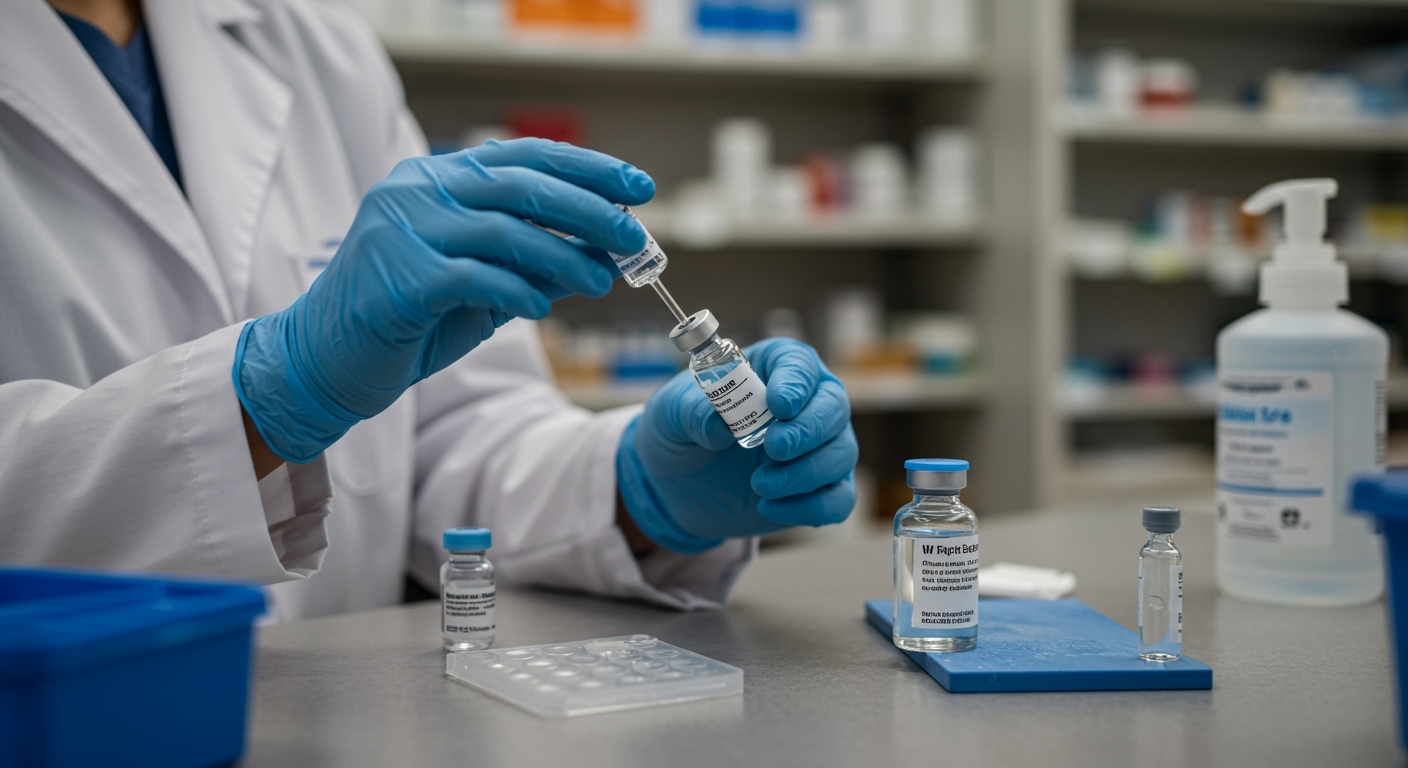What is a Diluent? The Role in Medication
Oct 17th 2025
Every drop of medicine matters in healthcare. Behind every injection or liquid solution lies careful preparation. A small mistake in mixing or measuring can change how a medicine works. This is where a diluent plays its key role. It aids in the proper, safe, and consistent injection of patients. Knowledge of what a diluent is assists doctors, nurses, and pharmacists in making medications properly. Seek also more by visiting Arpovo Health Solutions, which discusses pharmaceutical solutions and how they can be safely used.

Defining Diluent vs. Dilutant
Terminological accuracy is highly valued in medicine. The words diluent and dilutant are commonly confused with each other, though they are slightly different. A diluent refers to a liquid that is used to mix or dissolve a drug prior to its administration to a patient. A dilutant, however, may include any substance that decreases the concentration of a substance. While both are related to dilution, their purposes are not identical. A diluent helps make an injectable solution ready for use, while a dilutant can be applied to both liquids and solids. For a clearer understanding, Arpovo Health provides detailed explanations in its guide on Sterile Diluent vs. Dilutant.
The Purpose of a Diluent
A diluent medication ensures that a drug reaches the patient in the right form and concentration. Some drugs are stored as powders to make them last longer. Others are in the form of concentrated liquids that require adjustment prior to usage. In either case, a diluent maintains the right dosage, stability, and consistency.
Reconstituting Powdered Drugs
Many injectable medicines come as powders. These are drugs that are in the form of powder and must be mixed first. The powder is fully dissolved using the diluent injection to produce a clear solution, which can be administered safely. In the absence of a suitable diluent, the drug can not dissolve, which results in inaccurate dosing. The appropriate diluent also contributes to the maintenance of the chemical balance of the drug. Healthcare professionals learn the right methods for reconstitution in training and follow approved standards. You can read more about these practices in the Arpovo Health guide on solution use in injections.
Diluting Liquid Concentrates
Certain drugs are too powerful in their original form. Giving them directly could cause irritation or side effects. In these instances, a diluent is used to bring the strength up to a level of safety and effectiveness. The process facilitates the maintenance of the right dosage of medication for the patient. In the case of strong antibiotics or vaccines, administering the appropriate dilution ratio is safer. By mixing properly, healthcare providers protect both the medicine’s quality and patient safety.
Common Types of Medical Diluents
Every drug needs a specific diluent depending on its composition. Not every medicine is dissolved by every diluent. There are a number of trusted methods of injections and infusions utilized in hospitals and clinics. The most popular ones are described below.
Sterile Water
One of the most common is Sterile Water for Injection (SWFI). It does not contain any antimicrobial agents, thus best suited to be used as a single-use application. SWFI helps dissolve powdered drugs easily and maintain purity. This sterile diluent for vaccines and injections is used when complete sterility is essential. Arpovo Health offers high-quality sterile water options in its pharmaceutical solutions.
Bacteriostatic Water
Bacteriostatic Water (BWFI) includes 0.9% of benzyl alcohol. This minimal dosage inhibits the proliferation of bacteria, which applies to multiple-dose vials. It enables a healthcare provider to reuse the same vial a few times safely. Not all drugs should, however, be mixed with bacteriostatic water; hence, a compatibility check is necessary. Arpovo Health is a reliable distributor of trustworthy brands such as Hospira Bacteriostatic Water, as well as offering comparisons of bacteriostatic and reconstitution solutions in the use of safe medicine use.
Normal Saline
Another popular diluent used in hospitals is the Normal Saline. It has 0.9 percent sodium chloride, which is equivalent to the natural salt content in the body. Due to this balance, it decreases injection site pain. Normal Saline is also applied intravenously (IV) and intramuscularly (IM). It provides osmotic balances, which keep the drug evenly spread in the body.
All these forms of diluents are crucial to safe, effective, and stable drug delivery. The correct decision will be based on the medication, its administration, and the condition of the patient.
Why the Correct Diluent is Critical
The wrong diluent may lead to severe problems. It may have an impact on the stability, potency, or safety of a drug. It may even cause the medicine to be harmful or ineffective in certain instances. As an example, a vaccine combined with an incorrect liquid may change the chemical structure. This may cause poor treatment or undesirable responses. U.S. hospital research indicated that about 12 percent of preparation errors involved the wrong choice of diluent. This highlights the importance of additional attention to the pharmaceutical handling and storage.
Healthcare facilities have to educate staff on diluent injection preparation, labeling, and use. Before reconstitution, every nurse or pharmacist ought to verify the appropriate combination. Arpovo Health’s educational blog provides useful resources that help prevent such errors in hospital settings. These best practices are time-saving, waste reduction, and enhance treatment outcomes.
Understanding Syringe Selection
The choice of a syringe varies depending on the kind of drug and mode of injection. And what is a syringe typically based on? It is founded primarily on the volume and the drug viscosity. A larger size of the needle may be needed to use thick or viscous solutions. In case of very fine injections, such as vaccinations, thinner and smaller syringes are used. The syringe should be the one that corresponds to the drug and the diluent. Appropriate choice of syringes determines accurate dosage and painless injections with no wastage. Arpovo Health also offers clear guidelines in syringe selection in order to assure the patient and the care provider with precision and comfort.
The Role of a Diluent in Vaccines
Vaccines are one of the most sensitive medical preparations. To get the right dose of vaccines, they usually need a sterile diluent. The sterile liquid helps to mix the vaccine powder safely and evenly. Applying an unsterile or wrong diluent may affect the quality of the vaccine. Clinicians adhere to the recommendations of the manufacturers to make sure that the vaccine and diluent are compatible. When mixed properly, the vaccine is effective and free of contaminants. It also secures smooth, stable, and painless injection to the patient.
Quality Control and Handling
A good diluent should be of high quality in terms of purity and sterility. Healthcare facilities store diluents under controlled conditions before usage to ensure quality. Staff are advised to read labels on expiry dates, ingredients, and instructions for use. Unsafe results could be obtained by using expired or contaminated diluents. Facilities like Arpovo Health ensure all their sterile solutions are tested and approved. This guarantees consistency and safety across every batch.
Key handling practices include:
- Always clean work areas and use sterile syringes.
- Do not use the same diluent vials again.
- Adhere to storage directions regarding temperature and light exposure.
- Dispose of the unused solutions properly to avoid contamination.
Such precautions prevent injuries to patients and practitioners when preparing injections.

Importance in Modern Medicine
The modern medical sector relies on accuracy and consistency. Regardless of keeping a small clinic or a big hospital, every day professionals use safe diluent medication options. Most drugs would not be prepared properly without them. Diluents guarantee consistent dosage, prolong product shelf life, and enhance positive treatment outcomes. They are also more convenient to administer and store injectable drugs. Knowledge of what constitutes a diluent enables healthcare providers to make more appropriate decisions when preparing and administering medications.
Final Thoughts
Any successful injection, vaccine, or infusion requires proper preparation. A diluent is never merely a mixture solvent; it is an essential component of effective and safe drug delivery. It is vital in patient treatment, whether it involves reconstituting powders or adjusting concentrations.
Knowledge of various kinds, such as sterile, bacteriostatic, and saline, aids professionals in making safe decisions. Using the correct diluent ensures that all the doses administered are accurate, stable, and effective.
For healthcare professionals and facility buyers seeking reliable U.S.-approved pharmaceutical solutions, visit Arpovo Health. Explore sterile diluents, bacteriostatic water, and other essential medical supplies for safe medication preparation.

